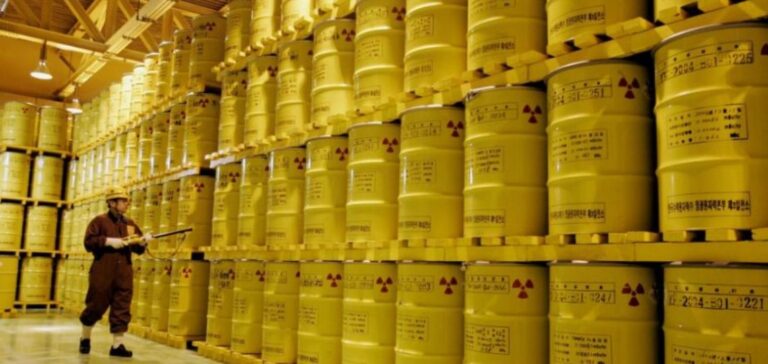Several hundred people demonstrated on Saturday in Bure (Meuse) against the Cigéo project to bury the most radioactive nuclear waste, at the close of the “Rencontres des luttes paysannes” (Farmers’ Struggle Encounters).
Demonstration against the disposal of radioactive waste in France: International activists join the march in Mandres-en-Barrois
The procession, opened by a banner reading “La Meuse n’est pas une poubelle nucléaire”, brought together anti-nuclear activists of different nationalities (French, Germans, Swiss, Brazilians, Colombians), local residents and families in a noisy and festive atmosphere for a march to the nearby commune of Mandres en Barrois.
Flags from La France insoumise, the Confédération paysanne, the Sortir du nucléaire network and the Solidaires union were visible.
“Nearly a thousand people took part in the Rencontres, and we were between 700 and 800 for the march,” Fred, a market gardener and member of the organizing committee, told AFP, declining to give his name.
“Some internationals didn’t take part in the march, they feel that policing in France is too violent,” he assured. In the words of Marie-Neige Houchard, departmental co-secretary of Europe-écologie-Les Verts (EELV), the demonstration was aimed at denouncing the government’s “heavy-handed approach” to “impose the landfill despite the opposition of the people of the Meuse”.
“There’s a complete denial of democracy surrounding this project. And then the elected representatives are being showered with public money to buy their consciences”, she lamented, referring to the 30 million euros distributed each year by the two Public Interest Groups (GIP) in Meuse and Haute-Marne for local economic development.
Anti-nuclear mobilization: demonstrators denounce the Cigéo project at Bure
“Cigéo gives the impression that we can use nuclear power, that the waste is manageable, whereas it’s there for tens of thousands of years,” said Pierre Ferté, a 58-year-old beekeeper from the Marne region of France.
“Burying them is really burying your head in the sand, it’s not a solution.” Marie Michaud, 30, a peasant agriculture project manager, is concerned about “land grabbing by Andra (Agence nationale pour la gestion des déchets radioactifs, the French national radioactive waste management agency) and Safer” (Société d’Aménagement Foncier et d’Etablissement Rural, the French land development company) for the benefit of Cigéo.
“It’s very complicated for a young farmer to set up here, because Andra has a stranglehold on the land,” says the young woman from Moselle.
“Today, we need farmers to keep this region alive.
The demonstration went off without a hitch. A large-scale security operation was set up by the prefecture, which authorized surveillance by drones and helicopters.
“The size of the operation is relatively large, with several mobile force units involved,” the prefecture told AFP, without specifying the number of agents mobilized.
In January, Andra submitted a request for authorization (DAC) for the Cigéo project, aimed at bringing to fruition the plan to bury nuclear waste at Bure. For the time being, Andra’s Meuse site only houses a scientific laboratory, and no radioactive waste is stored there.





















